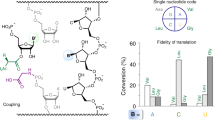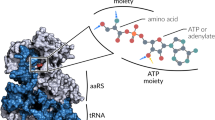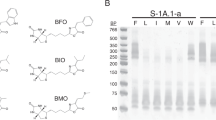Abstract
A SPECIAL type of ribonucleic acid, the ‘messenger’ RNA, has been postulated recently, which is assumed to specify the sequence of the amino-acid constituents of a given protein1. This RNA is said to be made under the control of deoxyribonucleic acid and to mirror the composition and the regularities (base-pairing, etc.)2 of the latter, with uracil substituting for thymine3–6. The existence, in DNA, of a nonoverlapping, ‘degenerate’ code, composed of nucleotide triplets that are ‘read’ from a fixed starting point, has also been put forward7. These advances have been paralleled by the equally recent elaboration of what would seem to be the complete amino-acid code in the form of a series of nucleotido triplets8–11.
This is a preview of subscription content, access via your institution
Access options
Subscribe to this journal
Receive 51 print issues and online access
$199.00 per year
only $3.90 per issue
Buy this article
- Purchase on Springer Link
- Instant access to full article PDF
Prices may be subject to local taxes which are calculated during checkout
Similar content being viewed by others
References
Jacob, F., and Monod, J., J. Mol. Biol., 3, 318 (1961).
Chargaff, E., in The Nucleic Acids, edit. by Chargaff and Davidson. 1, 307 (New York, 1955).
Volkin, E., and Astrachan, L., in The Chemical Basis of Heredity, edit. by McElroy and Glass, 686 (Baltimore, 1957).
Nomura, M., Hall, B. D., and Spiegelman, S., J. Mol. Biol., 2, 306 (1960).
Gros, F., Hiatt, H., Gilbert, W., Kurland, C. G., Risebrough, R. W., and Watson, J. D., Nature, 190, 581 (1961).
Hayashi, M., and Spiegelman, S., Proc. U.S. Nat. Acad. Sci., 47, 1564 (1961).
Crick, F. H. C., Barnett, L., Brenner, S., and Watts-Tobin, R. J., Nature, 192, 1227 (1961).
Nirenberg, M. W., and Matthaei, J. H., Proc. U.S. Nat. Acad. Sci., 47, 1588 (1961).
Lengyel, P., Speyer, J. F., and Ochoa, S., Proc. U.S. Nat. Acad. Sci., 47, 1936 (1961).
Speyer, J. F., Lengyel, P., Basilio, C., and Ochoa, S., Proc. U.S. Nat. Acad. Sci., 48, 63 (1962).
Martin, R. G., Matthaei, J. H., Jones, O. W., and Nirenberg, M. W., Biochem. Biophys. Res. Comm., 6, 410 (1961–62).
Hirs, C. H. W., Moore, S., and Stein, W. H., J. Biol. Chem., 219, 623 (1956); 235, 633 (1960).
The New York Times, 14 (February 2, 1962).
Magasanik, B., in The Nucleic Acids, edit. by Chargaff and Davidson, 1, 373 (New York, 1955). Belozersky, A. N., and Spirin, A. S., ibid., 3, 147 (New York, 1960).
Elson, D., and Chargaff, E., Nature, 173, 1037 (1954). Biochim. Biophys. Acta, 17, 367 (1955).
Author information
Authors and Affiliations
Rights and permissions
About this article
Cite this article
CHARGAFF, E. Calculated Composition of a ‘Messenger’ Ribonucleic Acid. Nature 194, 86–87 (1962). https://doi.org/10.1038/194086a0
Issue Date:
DOI: https://doi.org/10.1038/194086a0
This article is cited by
-
�bertragung der genetischen Information
Die Naturwissenschaften (1963)
-
Polyribonucleotide-directed Protein Synthesis using an E. coli Cell-free System
Nature (1962)
-
Experimental Evidence for the Degeneracy of the Nucleotide Triplet Code
Nature (1962)
Comments
By submitting a comment you agree to abide by our Terms and Community Guidelines. If you find something abusive or that does not comply with our terms or guidelines please flag it as inappropriate.



